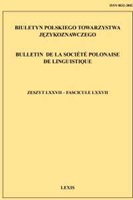Rząd, porządek i ład jako leksemy wpisane w dawne pojęcie porządek społeczny
Rząd, porządek and ład as Polish lexemes inscribed in the old concept of social order
Author(s): Beata Raszewska-ŻurekSubject(s): Historical Linguistics, Sociolinguistics, Western Slavic Languages
Published by: Polskie Towarzystwo Językoznawcze
Keywords: social order; social vocabulary; Old Polish; Middle Polish; collocation; semantic relations;
Summary/Abstract: The article is devoted to the occurrence of the main exponents of the concept of porządek społeczny [social order] in Old and Middle Polish texts, i.e. the lexemes: rząd – the earliest one, porządek – the most frequent one, and ład – the most recent and rare. The analysis explores the nominal collocations of these items, which indicate semantic relations with other words. The analysis enables us to discover the links between the concepts to which they refer, but it is not sufficient to establish their nature in an accurate manner. There is an indication of 1) a strong interdependence of the early social order and law, 2) of the superiority in reference to a number of concepts which represent the sphere of social relationships, such as zgoda [harmony] and pokój [peace], 3) of a relationship that is akin to resulting in respect to utilitarian concepts, such as bogactwo [opulence] and zapobiegliwość [foresight], and 4) of the ambiguous relationship with the concepts of wolność [freedom] and sprawiedliwość [justice]. The place of social order in the sphere of social concepts was established during the Renaissance and remained stable until the end of the Middle Polish period, whereas the concept itself was associated at that time with a positive axiological charge.
Journal: Biuletyn Polskiego Towarzystwa Językoznawczego
- Issue Year: LXXVII/2021
- Issue No: 77
- Page Range: 175-192
- Page Count: 18
- Language: Polish

